HOW TO DESCRIBE YOUR FAMILY IN FRENCH

More often than not, we asked to talk about our family in French in an examination or when we visit our neighbouring French-speaking countries. This lesson focuses on the guidelines to clearly and simply describe your family in French with little or no difficulty. This lesson will focus on three main objectives:
1. Knowing how to call the members of your family in French. 2. Knowing how to describe the structure of your family in French. 3. Write an essay on the topic “ma famille” (my family).
I./ Knowing how to call the members of your family in French Les membres de la famille (members of the family)
II./ Knowing how to describe the structure of your family in French To describe the structure of your family in French, you need to follow the guidelines below: 1. Ton nom (your name). Here, you need to mention your name in any of the following formats: . Je m’appelle Elvis Fiati. Mon est Fiati, mon prénom est Elvis. (My name is Elvis Fiati. My surname is Fiati, my First name is Elvis) . Je me nomme Elvis Fiati. (I am by name Elvis Fiati) . On m’appelle Elvis Fiati. (I am called Elvis Fiati)
1. Ton village natale (your hometown) Here, you need to talk about where you come from as shown in the example below: . Nous sommes de Hohoe dans la région de la Volta du Ghana. . Nous venons de Krobo Adumase dans la région orientale du Ghana.
2. Combien de membres comprend ta famille (how many members is your family made up of?) In this case, you need to mention the number of members in your family depending on the type of family (nuclear or extended) you want to describe as shown in the examples below: . Ma famille comprend neuf (9) membres. (my family is made up of 9 members) . Il y a neuf membres dans ma famille. (there are 9 members in my family)
3. Nomme les membres de ta famille (name the members of your family) Here, you need not to mention their real names but who they are to you (your relationship with them). See the example below: . J’ai un frère, deux sœurs, mes parents, ma grand-mère, mon oncle, ma tante et moi-même (I have a brother, two sisters, my parents, my grandmother, my uncle, my aunt and myself)
4. Tu aimes ta famille? Pourquoi? (do you like your family? Why?) Here, you need to say whether you like your family or not and state why you do or do not like your family. See the examples below. . J’aime ma famille parce que nous sommes courageux et gentils. (I like my family because we are courageous and kind) . Ma famille est riche et honorée dans ma localité. J’aime bien ma famille. (My family is rich and honoured in my locality. I really like my family) III./ Write an essay on the topic “ma famille” (my family) Ma famille Je m’appelle John Mahama. Je suis de la famille Mahama. Nous sommes de Bole Banboi dans la région du nord au Ghana. Il y a cinq (5) personnes dans ma famille: Mr et Mme Mahama, mes parents, mon frère ainée Ibrahim Mahama, ma sœur Alima Mahama et moi-même. Nous habitons à Accra. Mon père et ma mère ont soixante-dix (70) et soixante-cinq (65) ans respectivement. Ibrahim a trente-huit (38) ans, Alima a vingt-cinq (25) ans et moi j’ai trente-cinq (35). Mon père est docteur, ma mère est comptable, mon frère est ingénieur, ma sœur est commerçante et moi-même je suis cultivateur et politicien. Notre plat favori est la Banku avec la sauce de gombo. Nous sommes chrétiens donc nous allons à l’église chaque dimanche. Mes parents dont riches et bien honorés dans la société et nous les enfants sommes très respectueux. J’aime beaucoup ma famille.
Try Yourself With This Exercise In not more than 180 words, describe your family to a friend in French. Thank you for reading. Kindly share the lesson for others to also benefit from it. Do you have a suggestion or contribution to make? Kindly drop it in the comment box. Merci.

Quick Links
- Course List
- Subscriptions
- French Lessons & News
- GAFT VOLTA/OTI
- Terms and Conditions
- Privacy Policy
- THE FRENCH MASTER GH
Unconventional language hacking tips from Benny the Irish polyglot; travelling the world to learn languages to fluency and beyond!
Looking for something? Use the search field below.
Home » Articles » Talk About Family in French – A Guide to French Family Vocabulary [with Audio]
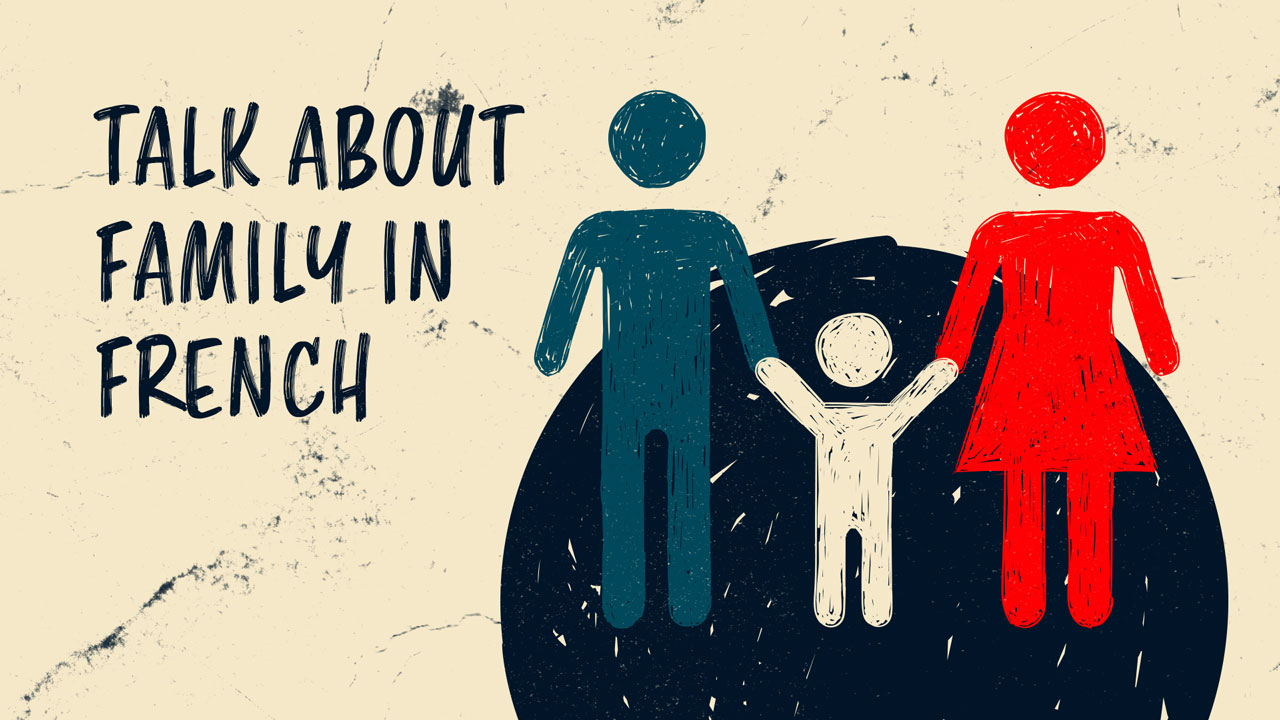
Full disclosure: This post contains affiliate links. ?
written by Alice Cimino
Language: French
Reading time: 13 minutes
Published: Feb 28, 2022
Talk About Family in French – A Guide to French Family Vocabulary [with Audio]
If you’re learning French, you should learn how to talk about family in French. That’s because family is an important topic that often comes up in conversations. In this article, I’ll share the words you need to know, with audio recordings from myself, a native French speaker.
Allons-y! Let’s get started.
Table of contents
French words to talk about your family.
- How to Say “Family” in French: Famille
Rules of Gender, Number Agreement, and the French Family Member Collectives
French terms of endearment for family members, how to write about your family in french – some more vocabulary.
- 1. Qu’est-ce qu’on a fait au Bon Dieu ?
- 2. C’est quoi cette famille?!
- 3. Il a déjà tes yeux
You’re All Set to Talk About Your Family in French!
Psst… Do you like French cinema? Stick around until the end of the article for French movie recommendations that revolve around family!
“Family” in French is famille .
To say “family member” in French you would say membre de la famille . You can also say parent , which also translates to “parent”, as in father or mother.
If you want to talk about family in French, you will need to know the appropriate words to describe the different liens de famille (“family relationships”).
Immediate family:
- la femme or l’épouse – “the wife”
- le mari or l’époux – “the husband”
- les parents – “the parents”
- la mère – “the mother”
- le père – “the father”
- les enfants – “the children”
- la fille – “the daughter”
- le fils – “the son”
- la sœur – “the sister”
- le frère – “the brother”
Extended family:
- la tante – “the aunt”
- l’oncle – “the uncle”
- la nièce – “the niece”
- le neveu – “the nephew”
- la cousine – “the cousin” (feminine)
- le cousin – “the cousin” (masculine)
- la petite-fille – “the grand-daughter”
- le petit-fils – “the grandson”
- la grand-mère – “the grandmother”
- le grand-père – “the grandfather”
- l’arrière-petite-fille – “the great-granddaughter”
- l’arrière-petit-fils – “the great-grandson”
- l’arrière-grand-mère – “the great-grandmother”
- l’arrière-grand-père – “the great-grandfather”
All of these form les proches (“close relations”).
Since this is a lot of information, you can download this chart to keep it for further studies:
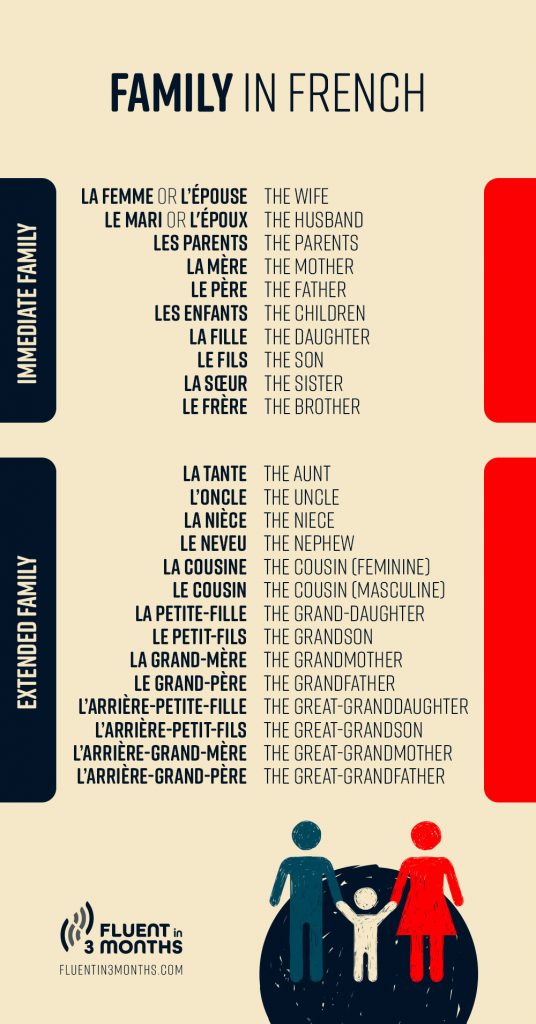
Step-family:
- la belle-mère – “the stepmother”
- le beau-père – “the stepfather”
- la demi-sœur – “the stepsister” or “the half-sister”
- le demi-frère – “the stepbrother” or “the half-brother”
- la belle-fille – “the stepdaughter”
- le beau-fils – “the stepson”
- la belle-mère – “the mother-in-law”
- le beau-père – “the father-in-law”
- la belle-sœur – “the sister-in-law”
- le beau-frère – “the brother-in-law
- la belle-fille – “the daughter-in-law”
- le beau-fils – “the son-in-law”
It might also be useful for you to learn the members of the “godparent family”:
- les parrains – “the godparents”
- la marraine – “the godmother”
- le parrain – “the godfather”
- la filleule – “the goddaughter”
- le filleul – “the godson”
How to Say “Family” in French: Famille
As I mentioned above, “Family” in French is famille .
Famille is a noun, so you will often see famille coming after an article or a pronoun.
The most common ones are:
- La famille – “(the) family”
- Une famille – “a family”
- Ma famille – “my family”
Let’s pause for a second and take a look at how similar famille is to “family”. These words are cognates : even though they’re from different languages, their spelling and pronunciation are similar, and they have the same meaning.
Cognates help you start learning a new language by giving you an instant vocabulary base. One of our favorite courses at Fi3M , French Uncovered , teaches you to recognise French cognates from the very start of yourjourney learning French. It’s a great way to feel more confident in your knowledge and less intimidated by your target language.
(Remember, at Fi3M we’re all about simple language hacks like this that help you learn a language faster 😉.)
The Different Types of Family in French
Once you’ve mastered how to say famille , you can go a little more in-depth and learn the different types of family categorization in French:
- la famille nucléaire or la famille traditionnelle – “immediate family”
- la famille monoparentale – “single-parent family”
- la famille recomposée – “stepfamily” or “reconstituted family”
- la famille élargie or la famille étendue – “extended family”
- la belle-famille – “in-laws”
- la famille adoptive – “adoptive family” or “foster family”
French follows rules of gender and number agreement. This means that if a noun is feminine, the article and adjective(s) that describe it will also be feminine. The same goes for when a noun is singular or plural. This is important to know if you want to describe your family members, for example.
Let’s look at how the agreement rules work.
While we’re looking at the plural forms of French family members, let’s talk about the collective terms for family members. These are words like “the parents” or “the siblings”, which describe the whole group of family members with the same titles, regardless of their gender.
Here are the most common:
- les parents – “the parents”
- all other terms with parents in them, such as les grandparents
- les enfants – “the children”
- all other terms with enfants in them, such as les petits-enfants
- les cousins – “the cousins”
For the other collective terms, you would mention the plural of both the masculine and femenine members. Here are some examples:
- les frères et sœurs – “the siblings”
- les oncles et tantes – “the uncles and aunts”
When you’re referring to several members of the same gender, for examples “the sisters”, you would use the plural of the term, so les sœurs .
When I’m speaking French with my parents, I don’t call my them * mère (“mother”) and père (father).
For parents, the most common terms used in French are:
- la maman – “the mom”
- le papa – “the dad”
There isn’t a collective term for parents other than parents in French, you would simply say maman et papa (“Mom and Dad”).
Grandparents too have their own terms of endearment:
- la mamie – “the granma”
- le papi (sometimes also spelt papy ) – “the grandpa”
You might also hear mémé (“grannie”) and pépé (“granda”), although they are more old fashioned words. My grandmother has never wanted her grandchildren to call her mémé ; she says it makes her sound too old!
For siblings, adding petit(e) or grand(e) does the work:
- petite sœur – “little sister”
- petit frère – “little brother”
- grande sœur – “big sister”
- grand frère – “big brother”
When it comes to the rest of the family, oncle has a more tender version: tonton (“uncle”). In some places, tante also has a sweeter version in tatie . In Guadeloupe, where I grew up, children use tatie as an affectionate term for women, even if they aren’t their aunts.
You’ve learnt the basics of French family vocabulary. Now are you ready for some more specific phrases?
Here are a few phrases you might want to know to talk or write about your family:
- J’ai une grande famille – “I have a big family.”
- J’aime ma famille – “I love my family.”
- La famille d’abord – “family comes first”
- La famille pour toujours – “family forever”
Depending on how deep you get into conversation about your family tree, you might want to know how to say just that. In French, “family tree” is arbre généalogique , which literally translates to “genealogical tree”.
French Cinema and Family – A Few Recommendations
French cinema likes to focus on family. Extended families, reconstituted families, adoptive families… All of them can be the foundation of great French comedy!
As promised at the beginning of the article, here are some of the most popular French films about family.
1. Qu’est-ce qu’on a fait au Bon Dieu ?

Qu’est-ce qu’on a fait au Bon Dieu ? , or “Serial (Bad) Weddings” in English, is a comedy that features an extended family.
Claude and Marie, a Catholic bourgeois couple from a small village in the north of France, see their conservative views challenged by the marriages of their daughters. The three eldest have married men of different ethnic origins and religious beliefs, so their hopes for a Catholic son-in-law rest with their youngest.
This movie and its sequel, which both star some famous French comedians, is a window into complex French modern culture.
2. C’est quoi cette famille?!

C’est quoi cette famille?! , or “We Are Family” in English, focuses on a reconstituted family.
After several marriages and divorces of both his parents, thirteen-year-old Bastien finds himself part of a very big reconstituted family. Tired of being moved from house to house for shared parenting, the many “half-siblings” decide to live together and have their parents move houses instead.
Even though this movie exaggerates for the sake of comedy, it taps into the reality of reconstituted families, which are very common in France.
3. Il a déjà tes yeux

Il a déjà tes yeux , “He Even Has Your Eyes” in English, is the story of a black couple who can’t have biological children and decide to adopt a baby. The baby is four-months-old, and white. Several people around the couple refuse to accept the adoption.
There is also a mini series whose events take place after the movie.
You can now shop at the père et fils business and listen to your B&B host’s story, and understand everything! Well, at least the part about the family.
If you’re looking for more vocabulary to learn, you could start by checking out this guide to 27 French colors (with audio).
If you’re ready for something else, try working on grammar! French pronouns are a good starting point.
Or maybe try some of these articles:
- How to Speak French: The Faster Way to Learn French
- FrenchPod101 Review: 30 Days with FrenchPod101
- 111 Core French Words — The Most Commonly Used Words in French
- An In-Depth Review of the Staircase Method — Learn a Language through Story
- 30+ Free Online French Classes and Resources (Only the Best!)
Alice Cimino
Student, Freelance Content Creator
Alice is an undergraduate student who loves fiction, languages, and challenges. She's a bilingual by birth and a quadrilingual by consequence .
Speaks: French, Italian, Spanish, English
Have a 15-minute conversation in your new language after 90 days

French Family Guide: Talking About Your Family in French

Your romance with a lovely French local has gained momentum and the time has come for one of the most terrifying milestones of ‘serious’ relationships: meeting your mother-in-law. Whether she’s a gatekeeper mom or just genuinely interested in her daughter’s “one and only,” chances are, you’ll be asked a lot of questions that will make you say: “Damn, how do I say mother in French? Or father or family in French?”
When meeting your parents-in-law, or any random person before a work meeting or over a beer, the trick is to find some common ground and get the other person to talk about something they can relate to. Hence, before you get to know a person and learn about your common interests, talking about their family or yours is a highly effective icebreaker.
Besides, have you ever noticed how often our relatives randomly pop into seemingly unrelated conversations? “My wife this,” “My mother that,” “My brother has the same thing,” and “My cousin has done that too!” As soon as you get comfortable with the vocabulary and the basic structures, it will unveil a whole lot of conversation opportunities and a wealth of follow-up questions to keep it going!
Learn how to describe family in French with FrenchPod101’s guide to family in French for beginners, and never lack the proper word again!
Table of Contents
- French Family Vocabulary: Complete Family Word List
- Beyond the Blood
- How to Talk About Family
- The French Family is Changing Rapidly
- How FrenchPod101 Can Help You Learn More French Vocabulary

1. French Family Vocabulary: Complete Family Word List
Before we get to talk about our family or inquire about somebody else’s, we’re gonna need some serious vocabulary! But don’t worry about the size of the list, just pick and remember whichever ones apply to your situation and the ones you’re typically going to ask about (siblings, kids?). You’ll learn the rest in due time as you continue talking about family in basic French.
1- The Inner Circle
Here are the most basic family members in French, the ones you’ll likely talk the most about.
/!\ Do not confuse mon parent , meaning “my relative,” and mes parents meaning “my parents.
Un parent meaning “a relative,” and des parents meaning “relatives,” both refer to relatives of any kind, while mes parents (possessive plural) means: “my parents” (in the sense of: mother and father).
- Je vais voir mes parents. “I’m going to see my parents.”
- J’ai des parents dans la région. “I have relatives in the region.”
- Comment vont ses parents ? “How are his parents doing?”
- Tu vis chez tes parents ? “Are you living with your parents?”
- Tu vis chez des parents ? “Are you living with relatives?”

Tel père, tel fils. (Like father, like son)
As you can see, there’s no specific word for “siblings” and we simply use “brothers and sisters.” For example, you could ask someone:
- Tu as des frères et soeurs ? “Do you have siblings?”
/!\ Be careful with the slang word gosses or “kids.”
In France, it’s very common and not overly familiar to use. However, in Canadian French, it has a completely different meaning and is vulgar slang for “testicles.” You can imagine how confusing these meanings could lead to some awkward misunderstandings.
2- French Extended Families
Extended family in French culture is important, so here are some words to help you start conversations about your loved ones outside your inner circle.
I’m talking about the one sending money on your birthday, not Marlon Brando.
Make sure to visit our vocabulary list about Family Members , with audio recordings to practice your pronunciation. It’s available for free on FrenchPod101 .
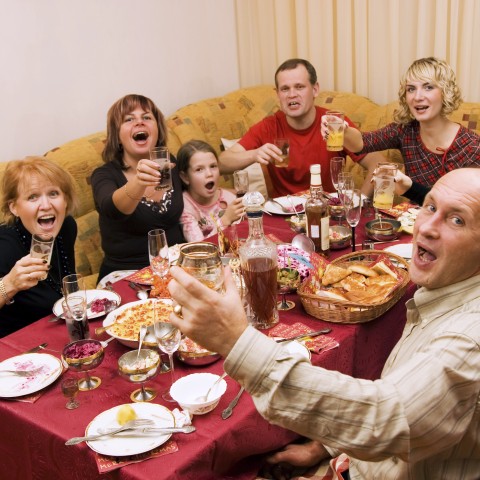
Famille nombreuse, famille heureuse. (Big Happy Family)
2. Beyond the Blood
Families extend beyond the people you share a blood relationship with. Let’s dive into the various types of these unrelated relatives.
Whether you’re in a relationship, engaged, married, single, divorced, separated, widowed, in a civil union, or in the type of situation Facebook describes as c’est compliqué (it’s complicated), talking about your marital status will often be useful.
Once you get married, you strap yourself to a whole bunch of “in-laws” that, with a bit of luck and a lot of work, might become as close as your own relatives.
Don’t you think that “beautiful mother” ( belle-mère ) or “handsome father” ( beau-père ) have a nicer ring to them than the legalish “mother-in-law” or “father-in-law?” As cheesy as it sounds, I feel like it helps to counter the negative association that many people have with the idea of having parents-in-law.
Meeting your “beautiful mother” ( Belle-mère – Mother-in-law)
3- Recomposed Family
Blended or reconstituted families (when the parents have children from previous relationships, but all the members come together under one roof) are increasingly common in France, and are slowly becoming the new normal. They bring unexpected stepfathers, stepbrothers, and usually a lot of complications to work through everyone’s differences. But it can also make broken families whole again and take a turn for the better.
/!\ Hold on! There’s something confusing here: does belle-mère stand for “mother-in-law” or “stepmother?” Both!
As inconvenient as it sounds, French uses the same set of words for parents-in-law and step-parents. But it’s not a problem, because it’s usually obvious from the context, right? Not always, and quite often, you’ll have to clarify who you’re talking about when referring to your “steps” or “in-laws.”
/!\ Wait…what about la demi-soeur ? Is it the “stepsister” or the “half-sister?” Both!
Demi literally means “half” and demi-soeur perfectly translates to “half-sister.” But then, we don’t have words for the step brothers & sisters, and it’s common to use demi-frère and demi-soeur , to make up for the lack of better words.
I personally use zéro-demi (or “zero-half” in English) to emphasize the difference, but there’s nothing official about it, and you won’t find it outside of this article!
3. How to Talk About Family

Now that we have a strong arsenal of new words at our disposal, let’s see how you can use them in a conversation. First, we’ll see how to talk about your marital status, then how to mention them in various ways, and finally how to ask questions and learn more about your friends’ families.
1- Your Marital Status
You could be asked about your marital status by friends or colleagues, for paperwork by any administrative office, or by a potential romantic interest on a date. Either way, no time to get it mixed-up!
Start with:
Je suis _______. “I am _______.”
And just pick from the list:
For example:
- Je suis marié. “I am married.” [Masculine]
- Je suis divorcée. “I am divorced.” [Feminine]
- Je suis célibataire. “I am single.” [Same for both genders.]
Most of these words are self-explanatory, but let’s talk about the civil union for a minute. The pacs or PACS ( Pacte Civil de Solidarité , or “Civil Solidarity Pact” in English) is, with the classic civil marriage, one of the two forms of civil union in France.
It was created in 1999, originally to give the same rights and legal protection to same-sex couples. Creating a new type of union instead of changing the traditional marriage was a clever way to not upset the conservative segment of the population, and it proved extremely successful.
Nowadays, the PACS is getting increasingly popular , especially for straight couples who find it more flexible and less bureaucratically heavy than getting married. They represent more than 95% of the total couples getting a PACS. Numbers are also showing that the PACS is slowly taking over traditional marriage.

Je suis mariée. (I am married.)
2- Questions and Answers About Family
With all the words that we’ve learned in the first part of this article, you’ll be able to talk about your family and ask the other person about their parents or brothers and sisters. Let’s have a look at the most common structures:
Est-ce que tu as _______ ? “Do you have _______?”
Tu as _______ ? “Do you have _______?”
- Tu as des frères ? “Do you have brothers?”
- Est-ce que tu as des cousins ? “Do you have cousins?”
- Tu as des enfants ? “Do you have children?”
You can answer with:
J’ai _______. “I have _______.”
- J’ai une soeur aînée. “I have an elder sister.”
- J’ai deux frères. “I have two brothers.”
- Je n’ai pas d’enfants. “I don’t have children.”
- J’ai trois mères. “I have three mothers.” This one is guaranteed to raise a lot of questions at a dinner party.
3- Talking About Family Members
There are many ways you could mention your relatives, and a number of things you may want to talk about, but here are a few examples to help you get the basic structures and elaborate from there:
- Mes parents habitent à Toulouse. “My parents are living in Toulouse.”
- Mes parents sont divorcés. “My parents are divorced.”
- Mon père est décédé l’an dernier. “My father died last year.”
- Ma grand-mère est Brésilienne. “My grandmother is Brazilian.”
- Mon grand-père est photographe. “My grandfather is a photographer.”
- Mes grand-parents vivent en Floride. “My grandparents live in Florida.”
- Ma soeur aînée a deux ans de plus que moi. “My elder sister is two years older than me.”
- Mon demi-frère a bientôt vingt ans. “My half-brother will be twenty soon.”
- Ma femme s’appelle Maurice. “My wife is called Maurice.”
Check out our Top 10 Quotes About Family on FrenchPod101 .
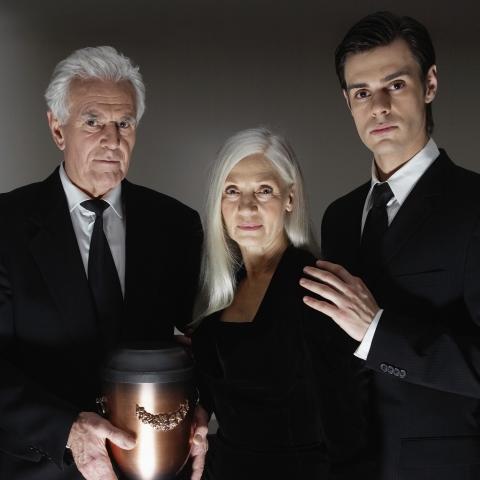
Mes parents habitent en Transylvanie. (My parents are living in Transylvania.)
4. The French Family is Changing Rapidly
Over the last few decades, the very concept of family in France has evolved, mutated, and broadened its definition. The family unit in French culture is now a mix of modernity and tradition, and while some are celebrating those changes, others are claiming that this once “sacred” institution got lured by progress and lost its way.
Before 1950, the French family was traditionally composed of two parents and often many children, as abortion remained illegal until 1975 . Couples were getting married young, often before their 20s, and didn’t divorce. The woman usually stayed home and was subject to the authority of her working husband.
Between 1950 and 2000, families began changing quickly. Divorces became increasingly frequent, as well as single-parent families. After WWII, women began emancipating, claiming more importance and freedom in and out of the household. More and more mothers started working, and the patriarchal system gave way to a more balanced separation of tasks and authority. French laws began evolving at the same time, reflecting these changes of mentalities.
After 1980, divorces and remarriage became commonplace, and three types of families were now frequently found all over France: “traditional” families, single-parent families (children raised by only one parent, usually the mother), and blended families (remarried partners living with children from former relationships).
Nowadays, the definition of the family has expanded a lot, thanks to the PACS (civil union) and the 2013 law on marriage and adoption for same-sex couples. 80% of women from 25 to 49 years old are working (even though income inequality remains an issue), and families are forming later in life.
The average age that mothers have their first child is around 30, and households rarely have more than one or two children . Children born outside of the traditional structure of a married couple are more and more frequent, with the rise of civil union or common-law union.
5. How FrenchPod101 Can Help You Learn More French Vocabulary

In this guide, you’ve learned a lot about how to talk about your family or ask about your friends’ relatives, from the giant word list to the most common questions and answers.
Did I forget any important words or expressions? Do you feel ready to get out there and reveal your most intimate family secrets, using everything you’ve learned today?
Make sure to explore FrenchPod101 , as it has plenty of free resources for you to practice your grammar and learn new words. Our vocabulary lists are also a great way to revisit the words in this article and learn their pronunciation.
Remember that you can also use our premium service, MyTeacher , to get personal one-on-one coaching. Practice talking about your family in French with your private teacher so they can give you personalized feedback and advice, and help you with your pronunciation.
About the Author: Born and bred in the rainy north of France, Cyril Danon has been bouncing off various jobs before he left everything behind to wander around the wonders of the World. Now, after quenching his wanderlust for the last few years, he’s eager to share his passion for languages.
Or sign up using Facebook
Got an account? Sign in here

How To Say ‘Thank you’ in French

How to Say “Hello” in French: Break the Ice Like a Pro!

How to Say I Love You in French – Romantic Word List

The French National Anthem: La Marseillaise

60 Classroom Phrases for Studying or Teaching in France

The Only Guide to French Restaurant Phrases You’ll Ever Need
How to celebrate april fools’ day in french.
- Forum Spotlight
- French Bazaar!!
- French Holidays
- French Language
- French Translation
- Scheduled Maintenance
- Guest Bloggers
- Advanced French
- French Grammar
- French Phrases
- French Podcasts
- French Words
- Tips & Techniques
- Media Coverage
- Feature Spotlight
- Success Stories
- Teaching French
- Team FrenchPod101
- Twitter Lessons
- Uncategorized
- Word of the Day
- Immigration, Visas
Copyright © 2024 Innovative Language Learning. All rights reserved. FrenchPod101.com Privacy Policy | Terms of Use . This site is protected by reCAPTCHA and the Google Privacy Policy and Terms of Service apply.
Which Language Do You Want to Learn?
- Inside Babbel
- Babbel Bytes
ARTICLES ABOUT
How to talk about family in french.

Whether you’re a native Spanish speaker, you only know English or you’re fluent in French, there’s one thing you share with almost every other person on the planet — you have a family. Sure, you may not always like that reality, but it’s one you can’t readily avoid; family is an essential part of what it means to be human. So when you’re learning a new language like French, Italian or Spanish it only makes sense that you should learn how to talk about your family in French, Italian or Spanish — or whatever your target language is.
Everyone around the world will likely need to talk about their family at some point, so it’s one of the most valuable language skills you can develop as you set out on your language learning journey. Plus, it makes great fodder for small talk when you’re getting to know someone (though some cultures might consider it a little too intimate and personal for first impressions, so be wary of that).
If it’s the French language you’re pursuing, look no further; we’ve got your comprehensive guide to talking about family in French right here. Make sure to click the play buttons next to each word to hear how they’re pronounced. Learning about la famille has never been easier!

The Must-Know Terms For Talking About Family In French
family — la famille
relatives — la famille élargie
extended family — la famille éloignée
mother — la mère
father — le père
parents — les parents
sister — la s œur
brother — le frère
siblings — les frères et s œurs
daughter — la fille
son — le fils
children — les enfants
grandmother — la grand-mère
grandfather — le grand-père
grandparents — les grands-parents
granddaughter — la petite-fille
grandson — le petit-fils
grandchildren — les petits-enfants
aunt — la tante
uncle — l’oncle
niece — la nièce
nephew — le neveu
cousin (female) — la cousine
cousin (male) — le cousin
cousins — les cousins
You are using an outdated browser. Please upgrade your browser or activate Google Chrome Frame to improve your experience.
How to Write an Essay in French Without Giving Yourself Away as a Foreigner
Have something to say?
When it comes to expressing your thoughts in French , there’s nothing better than the essay.
It is, after all, the favorite form of such famed French thinkers as Montaigne, Chateaubriand, Houellebecq and Simone de Beauvoir.
In this post, I’ve outlined the four most common types of essays in French, ranked from easiest to most difficult, to help you get to know this concept better.
Why Are French Essays Different?
Must-have french phrases for writing essays, 4 types of french essays and how to write them, 1. text summary (synthèse de texte).
- 2. Text Commentary (Commentaire de texte)
3. Dialectic Dissertation (Thèse, Antithèse, Synthèse)
- 4. Progressive Dissertation (Plan progressif)
And one more thing...
Download: This blog post is available as a convenient and portable PDF that you can take anywhere. Click here to get a copy. (Download)
Writing an essay in French is not the same as those typical 5-paragraph essays you’ve probably written in English.
In fact, there’s a whole other logic that has to be used to ensure that your essay meets French format standards and structure. It’s not merely writing your ideas in another language .
And that’s because the French use Cartesian logic (also known as Cartesian doubt) , developed by René Descartes , which requires a writer to begin with what is known and then lead the reader through to the logical conclusion: a paragraph that contains the thesis. Through the essay, the writer will reject all that is not certain or all that is subjective in his or her quest to find the objective truth.
Sound intriguing? Read on for more!
Before we get to the four main types of essays, here are a few French phrases that will be especially helpful as you delve into essay-writing in French:
Introductory phrases , which help you present new ideas.
Connecting phrases , which help you connect ideas and sections.
Contrasting phrases , which help you juxtapose two ideas.
Concluding phrases , which help you to introduce your conclusion.
FluentU takes authentic videos—like music videos, movie trailers, news and inspiring talks—and turns them into personalized language learning lessons.
You can try FluentU for free for 2 weeks. Check out the website or download the iOS app or Android app.
P.S. Click here to take advantage of our current sale! (Expires at the end of this month.)

Try FluentU for FREE!
The text summary or synthèse de texte is one of the easiest French writing exercises to get a handle on. It essentially involves reading a text and then summarizing it in an established number of words, while repeating no phrases that are in the original text. No analysis is called for.
A synthèse de texte should follow the same format as the text that is being synthesized. The arguments should be presented in the same way, and no major element of the original text should be left out of the synthèse.
Here is an informative post about writing a synthèse de texte , written for French speakers.
The text summary is a great exercise for exploring the following French language elements:
- Synonyms , as you will need to find other words to describe what is said in the original text.
- Nominalization , which involves turning verbs into nouns and generally cuts down on word count.
- Vocabulary , as the knowledge of more exact terms will allow you to avoid periphrases and cut down on word count.
While beginners may wish to work with only one text, advanced learners can synthesize as many as three texts in one text summary.
Since a text summary is simple in its essence, it’s a great writing exercise that can accompany you through your entire learning process.
2. Text Commentary (Commentaire de texte)
A text commentary or commentaire de texte is the first writing exercise where the student is asked to present an analysis of the materials at hand, not just a summary.
That said, a commentaire de texte is not a reaction piece. It involves a very delicate balance of summary and opinion, the latter of which must be presented as impersonally as possible. This can be done either by using the third person (on) or the general first person plural (nous) . The singular first person (je) should never be used in a commentaire de texte.
A commentaire de texte should be written in three parts:
- An introduction , where the text is presented.
- An argument , where the text is analyzed.
- A conclusion , where the analysis is summarized and elevated.
Here is a handy in-depth guide to writing a successful commentaire de texte, written for French speakers.
Unlike with the synthesis, you will not be able to address all elements of a text in a commentary. You should not summarize the text in a commentary, at least not for the sake of summarizing. Every element of the text that you speak about in your commentary must be analyzed.
To successfully analyze a text, you will need to brush up on your figurative language. Here are some great resources to get you started:
- Here’s an introduction to figurative language in French.
- This guide to figurative language presents the different elements in useful categories.
- This guide , intended for high school students preparing for the BAC—the exam all French high school students take, which they’re required to pass to go to university—is great for seeing examples of how to integrate figurative language into your commentaries.
- Speaking of which, here’s an example of a corrected commentary from the BAC, which will help you not only include figurative language but get a head start on writing your own commentaries.
The French answer to the 5-paragraph essay is known as the dissertation . Like the American 5-paragraph essay, it has an introduction, body paragraphs and a conclusion. The stream of logic, however, is distinct.
There are actually two kinds of dissertation, each of which has its own rules.
The first form of dissertation is the dialectic dissertation , better known as thèse, antithèse, synthèse . In this form, there are actually only two body paragraphs. After the introduction, a thesis is posited. Following the thesis, its opposite, the antithesis, is explored (and hopefully, debunked). The final paragraph, what we know as the conclusion, is the synthesis , which addresses the strengths of the thesis, the strengths and weaknesses of the antithesis, and concludes with the reasons why the original thesis is correct.
For example, imagine that the question was, “Are computers useful to the development of the human brain?” You could begin with a section showing the ways in which computers are useful for the progression of our common intelligence—doing long calculations, creating in-depth models, etc.
Then you would delve into the problems that computers pose to human intelligence, citing examples of the ways in which spelling proficiency has decreased since the invention of spell check, for example. Finally, you would synthesize this information and conclude that the “pro” outweighs the “con.”
The key to success with this format is developing an outline before writing. The thesis must be established, with examples, and the antithesis must be supported as well. When all of the information has been organized in the outline, the writing can begin, supported by the tools you have learned from your mastery of the synthesis and commentary.
Here are a few tools to help you get writing:
- Here’s a great guide to writing a dialectic dissertation .
- Here’s an example of a plan for a dialectic dissertation , showing you the three parts of the essay as well as things to consider when writing a dialectic dissertation.
4. Progressive Dissertation ( Plan progressif)
The progressive dissertation is slightly less common, but no less useful, than the first form.
The progressive form basically consists of examining an idea via multiple points of view—a sort of deepening of the understanding of the notion, starting with a superficial perspective and ending with a deep and profound analysis.
If the dialectic dissertation is like a scale, weighing pros and cons of an idea, the progressive dissertation is like peeling an onion, uncovering more and more layers as you get to the deeper crux of the idea.
Concretely, this means that you will generally follow this layout:
- A first, elementary exploration of the idea.
- A second, more philosophical exploration of the idea.
- A third, more transcendent exploration of the idea.
This format for the dissertation is more commonly used for essays that are written in response to a philosophical question, for example, “What is a person?” or “What is justice?”
Let’s say the question was, “What is war?” In the first part, you would explore dictionary definitions—a basic idea of war, i.e. an armed conflict between two parties, usually nations. You could give examples that back up this definition, and you could narrow down the definition of the subject as much as needed. For example, you might want to make mention that not all conflicts are wars, or you might want to explore whether the “War on Terror” is a war.
In the second part, you would explore a more philosophical look at the topic, using a definition that you provide. You first explain how you plan to analyze the subject, and then you do so. In French, this is known as poser une problématique (establishing a thesis question), and it usually is done by first writing out a question and then exploring it using examples: “Is war a reflection of the base predilection of humans for violence?”
In the third part, you will take a step back and explore this question from a distance, taking the time to construct a natural conclusion and answer for the question.
This form may not be as useful in as many cases as the first type of essay, but it’s a good form to learn, particularly for those interested in philosophy. Here’s an in-depth guide to writing a progressive dissertation.
As you progress in French and become more and more comfortable with writing, try your hand at each of these types of writing exercises, and even with other forms of the dissertation . You’ll soon be a pro at everything from a synthèse de texte to a dissertation!
FluentU has a wide variety of great content, like interviews, documentary excerpts and web series, as you can see here:

FluentU brings native French videos with reach. With interactive captions, you can tap on any word to see an image, definition and useful examples.

For example, if you tap on the word "crois," you'll see this:

Practice and reinforce all the vocabulary you've learned in a given video with learn mode. Swipe left or right to see more examples for the word you’re learning, and play the mini-games found in our dynamic flashcards, like "fill in the blank."

All throughout, FluentU tracks the vocabulary that you’re learning and uses this information to give you a totally personalized experience. It gives you extra practice with difficult words—and reminds you when it’s time to review what you’ve learned.
Start using the FluentU website on your computer or tablet or, better yet, download the FluentU app from the iTunes or Google Play store. Click here to take advantage of our current sale! (Expires at the end of this month.)
Enter your e-mail address to get your free PDF!
We hate SPAM and promise to keep your email address safe
'Family' Vocabulary in French
Vocabulaire Français de la Famille
- Pronunciation & Conversation
- Resources For Teachers
:max_bytes(150000):strip_icc():format(webp)/camille-chevalier-karfis-French-today-bio-56a32a2c5f9b58b7d0d0afaa.jpg)
If you're learning to speak French , you might find yourself talking about la famille among friends and relatives quite a lot. To simplify the learning for you, this article first introduces an overview of close and extended family members in French, then clarifies some of the common misconceptions and differences between the English and French expressions. Finally, you are presented with a sample dialogue on the topic of family.
La Famille Proche ( Close Family Members)
As you will see, there are a few similarities between some of the English and French vocabulary about family that might help your understanding and memorization. You might also note commonalities between the two genders , as in some cases it is possible to simply add an "e" to the end of a word to change it from masculine to feminine.
L a Famille Etendue ( Extended Family)
Famille par mariage (family by marriage) / la famille recomposée (blended family).
In French, step-family and family-in-law are labeled using the same terms: beau- or belle- plus that family member:
French does not have a special word for a step-sibling. The dictionary would say un beau-frère and une belle-soeur or un demi-frère and une demi-soeur (the same as half-brother or half-sister), but in everyday French , you might also use a phrase like quasi frère or quasi soeur (almost brother, almost sister) or explain your relationship using your stepparent.
Other Family Terms
Parents vs. relatives.
The phrase les parents usually refers to the parents, as in "mom and dad." However, when used as generic terms, un parent and une parente, the meaning changes into that of a "relative."
Using parent/parente can become confusing in some sentence structures. Note the use of the word des in the second sentence:
- Mes parents sont en Angleterre. My parents [my mom and dad] are in England.
- J’ai des parents en Angleterre. I have some relatives in England.
Because of the confusion, French speakers don’t use un parent and une parente as often as English speakers do the word “relatives.” Instead, you will hear them use the word famille . It’s singular and feminine.
- Ma famille vient d’Alsace. My family is from Alsace.
You may add the adjective éloigné(e) (distant) to make the distinction, as in:
- J’ai de la famille (éloignée) en Belgique. I have relatives in Belgium.
Or, you can be more specific about identifying relationships, as in:
- J’ai un cousin aux Etats-Unis. I have a cousin in the U.S.
- J’ai un cousin éloigné aux Etats-Unis. I have a distant cousin in the U.S.
In French, this means s/he is not necessarily a first cousin (child of a parent's sibling), but could be the person’s a second or third cousin.
Common Confusions
It might also be a good reminder that the adjectives “grand” and “petit” in family vocabulary don’t pertain to people’s sizes. They are rather indicators of age.
Similarly, the adjectives “beau” and “belle” don’t mean beautiful when describing family relationships, but are used for “in-law” or “step” family.
Family Vocabulary in Dialogue
To aid in learning French family vocabulary , you can view the terms we learned above in a simple dialogue, as in this example where Camille et Anne parlent de leurs familles (Camille and Ann are talking about their families).
- Meet a French Family: Easy French-English Bilingual Story
- French Valentine's Day Traditions: Easy Bilingual Story
- French Vocabulary: Physical Descriptions of People
- Christmas in France: a Fun French-English Side-by-Side Story
- Du, De La, Des: Expressing Quantities in French
- Useful Phrases to Use in French Class
- Popular English Sayings Translated into French
- 6 Idioms Using the Word for 'Dog' in French
- French Vocabulary: Personality Traits
- Typical New Year's Greetings in French
- How to Use the French Verb Vivre (to Live)
- An Introduction to French Articles
- All About 'Avoir,' a French Super Verb
- How the French Describe Clothing Shape, Texture and More
- French Subject Pronouns (Pronoms sujets)


All The French Words You Need To Talk About Your Family

- Read time 12 mins

Do you know the words needed to identify members of your family in French? 👨👩👧👦
It’s clearly important, especially if someone asks you about your family and, for example, wants to know how old your frère is.
If you’ve found that talking about your family members once you’ve introduced yourself is a bit difficult because you don’t have the French vocabulary, this guide will help.
This guide will help you revise what you’ve covered in your French course .
How do you say family in French?
The word for “family” is la famille .
It’s a feminine noun, which you can tell by looking at the feminine article la .
To say “family members”, use the phrase les membres de la famille . It’s not too difficult to remember, since the word “members” is practically a cognate.
What does parent mean in French?
The French word parent has two meanings:
- It can refer to your “mother” or “father” and, in this sense, is used to refer to your “parents”. In this sense, it’s not difficult to remember because it’s the same in English.
- The word parent can also mean “relative”, and is used as a French adjective and a noun in this regard.
For example, you wanted to tell someone that you don’t have relatives in Canada, you could say:
Je n’ai pas de parents au Canada.
Alternatively, you could use parents as an adjective to describe how you are related to one of your family members.
In this sense, parents means “related”. Here’s an example of how to use it:
Nous ne sommes pas parentes.
Essential vocabulary for speaking about and identifying family in French
Now that we’ve covered some of the basics, let’s turn our attention to the essential vocabulary needed to speak about and identify family in French.
I’ve split this section into immediate and wider members of the family in French.
Vocabulary to speak about immediate family in French
Here are some of the vocabulary you can use to speak about your immediate family in French.
Which of these do you know?
Use mère when you want to say “mother” in French. This feminine French noun can be used to talk about your female parent.
Usage example:
Ma mère aime cuisiner des plats italiens.
Use père when you want to say “father” in French. This masculine French noun can be used to identify and speak about your male parent.
Mon père aime réparer les ordinateurs et créer des logiciels.
Les parents can be used to talk about both your mother and father in French. This phrase is a cognate, so you’ll have less trouble remembering it.
Mes parents se sont rencontrés à l’université. Ils ont tous deux étudié la littérature française.
Sœur is a feminine French noun that translates to English as “sister”. Use it when you want to identify your female sibling in French.
Ma sœur aime lire des livres et regarder des films espagnols.
Frère is the French noun for “brother”. If you’re describing your male sibling, who has the same parents as you, use frère to identify them.
Est-ce que ton frère aime le football ?
Frères et sœurs
The French word for “siblings” is frères et sœurs . This phrase literally translates to “brothers and sisters” in English.
Les frères et sœurs de Louisa se disputent toujours à propos des programmes télévisés qu’ils regardent.
Combining the words “grand” and “mère”, meaning “grand” and “mother” in English, this French noun means “grandmother”. If you’re refering to your father’s mother, or your mother’s mother, use grand-mère .
Sophie avait l’habitude d’aller à l’église avec sa grand-mère tous les week-ends.
This French noun combines the words “grand” and “père”, which mean “grand” and “father. It means “grandfather” in English and can be used to refer to your mother’s father, or your father’s father.
Sophie demandait des chocolats à son grand-père tous les samedis.
Grands-parents
Combining the words “grands” and “parents” this French noun means “grandparents”. You can use it to speak about the parents of your parents.
Leurs grands-parents sont nés en 1920.
Femme means “wife” in French. It can be used to refer to a married woman in a spousal relationship with her husband.
Sa femme voulait divorcer mais a décidé de réessayer.
Mari means “husband” in French. Use it to refer to a married man in a spousal relationship with his wife.
Son mari l’aimait beaucoup mais ne voulait pas d’enfant.
Use fille when you want to talk about a “daughter” or someone’s daughter. Note the difference between enfant and fille . Use fille to talk about a daughter of any age, and enfant when talking about a child.
Notre fille étudie la langue espagnole. Elle veut aller au Pérou.
Fils means “son” in English. Use this French noun to identify someone’s son in French.
Notre fils étudie la langue italienne. Il veut aller en Italie.
Enfants , which is similar to the partial cognate “infants”, means children in English. Use this French noun when referring to more than one child.
Nos enfants aiment jouer aux jeux vidéo. Ils ne font pas de sport.
Petite fille
Petite fille means “granddaughter” in English. Use this French noun to refer to the daughter of your daughter or the daughter of your son.
Ma petite-fille me ressemble. Elle a la même couleur de cheveux.
Petit fils translates to English as “grandson”. This French noun can be used to refer to the son of your daughter or the son of your son.
Mon petit-fils ressemble à son père. Leur nez et la forme de leurs yeux sont identiques.
Petits enfants
Use petits enfants as the plural form of petit enfant to identify or talk about several “grandchildren” in the French language.
Tous ses petits-enfants sont gentils les uns avec les autres. Ils sont polis et respectueux.
Vocabulary to speak about wider family in French
Let’s now focus on the vocabulary you can use to speak about your extended family in French. Which ones do you recognise? Which ones do you need to revise?
Tante means “aunt” in English. Use this to refer to the sister of your mother, the sister of your brother, or your uncle’s wife.
Ma tante fait des gâteaux le week-end et les partage avec nous.
Use oncle to refer to your “uncle” in French. This is a sort of cognate that makes oncle simpler to remember.
Mon oncle nous aide à installer des logiciels sur nos ordinateurs.
Grand-tante
A grand-tante , which combines the words grand and tante , is your “great-aunt” or “great-aunty” in English. Keep in mind that this French noun contains the word tante , meaning aunt, which will help you to remember this one.
Sa grand-tante est décédée la semaine dernière. Il était très triste.
Grand-oncle
Grand-oncle means “great-uncle” in English. Try to remember that oncle means “uncle”, which will help you remember this family member more easily.
Ma grand-oncle est toujours en vie. Il a cent deux ans.
Cousine is a French noun that means “female cousin”. Use this to refer to the daughter of your aunt or uncle.
Ma cousine a le même âge que moi. Nous avons tous les deux trente et un ans.
Just like the Spanish family members , “cousin” has a masculine and feminine word. Cousin is a masculine French noun that means “male cousin”. Use this noun to refer to the son of your aunt or uncle.
Mon cousin est plus âgé que moi. Nous aimons tous les deux patiner et manger du chocolat.
Cousins is the plural form of the French noun cousin . Use it to refer to several cousins – that is the sons and daughters of your aunts and uncles.
Tous mes cousins aiment chanter et danser. Je n’aime pas ça.
This cognate, though pronounced differently in French, means “niece” in English. Use this noun to refer to the female child of your brother or sister. Your nièce can also be the daughter of your brother- or sister-in-law.
Je suis allé à l’hôpital quand ma nièce est née. Elle était petite, mais ne pleurait pas beaucoup.
A neveu is your “nephew”. Use this French noun to talk about the male son of your brother or your sister. Your neveu can also be the son of your brother- or sister-in-law.
Mon neveu est très méchant. Mais il est aussi très drôle.
Belle-mère means “stepmother”. You can use this French noun to talk about a female partner of your father, where the female partner is not your biological mother and has married your father after divorce or separation.
Je ne connais pas très bien ma belle-mère, mais elle a l’air très gentille.
Beau-père means “stepfather”. Use this French noun to refer to the male partner of your mother, where the male partner is not your biological father, or has married your mother after separation.
Je connais très bien mon beau-père. Il est très sérieux mais très gentil.
Belle fille
Use belle fille to refer to your “daughter-in-law” when speaking in French.
J’aime ma belle-fille comme si elle était mon propre enfant.
Use beau fils to refer to your “son-in-law” when speaking in French.
Mon beau-fils est très intelligent et aimant.
Containing the words demi (meaning “half”) and sœur (meaning “sister”) demi-sœur means “half-sister” or “step sister”.
Ma demi-sœur vit au Canada. Je ne l’ai jamais rencontrée.
Containing the words demi (meaning “half”) and frère (meaning “brother”) demi-frère means “half-brother” or “step brother”.
Mon demi-frère vit en Côte d’Ivoire. Je lui ai rendu visite l’année dernière.
Use marraine to refer to your godmother in French.
Ma marraine s’occupe de moi quand je ne vais pas bien.
Use parrain to refer to your godfather in French.
Mon parrain m’a appris à attraper un ballon de rugby.
Your goddaughter is your filleule in French.
Sa filleule n’a jamais réalisé qu’elle n’était pas sa mère biologique.
Your godson is your filleul in French.
Mon filleul est un garçon heureux et énergique.
Belle-sœur means “sister-in-law” in French. Use this French noun to refer to the daughter of your stepmother or stepfather.
Je suis tellement contente d’avoir une belle-sœur. Mon frère était très ennuyeux.
Beau-frère means “brother-in-law” in French. Use this French noun to refer to the son of your stepmother or stepfather.
Mon beau-frère n’arrête pas de parler. Il parle de choses ennuyeuses.
Speak about family in French and ask others about theirs
If you’re in a country where French is spoken , being able to talk about your family members is important. It’s crucial that you learn the right French words to describe your family.
Looking at the list, it might seem daunting.
But practising a little bit each day, and memorising these nouns will give you more confidence when chatting about your relatives.
Any other French family members I missed?
Comment below.
🎓 Cite article
Learning French ?
French Resources:
Let me help you learn french join the guild:.
Donovan Nagel - B. Th, MA AppLing
- Affiliate Disclaimer
- Privacy Policy
- About The Mezzofanti Guild
- About Donovan Nagel
- Essential Language Tools
- Language Calculator
SOCIAL MEDIA
Current mission.

Let Me Help You Learn French
- Get my exclusive French content delivered straight to your inbox.
- Learn about the best French language resources that I've personally test-driven.
- Get insider tips for learning French.
Don’t fill this out if you're human:
No spam. Ever.
Frenchlanguagebasics 🇫🇷
Learn French the fast and easy way!
Useful phrases in French: Talking about your family
Talking about your family is a great way to connect with others and share information about yourself in French. Whether you’re meeting new people or practicing your language skills, knowing some basic French phrases can help you express yourself and communicate more effectively.
In this lesson, we’ll go over some useful French phrases that will come in handy when talking about your family.
“Je suis marié(e)” – “I am married” Use this phrase to inform someone that you are married. If you’re not married, you can say “Je suis célibataire” to indicate that you’re single.
“J’ai des enfants” – “I have children” This phrase is useful when you want to mention your children. You can provide more details by following up with their names, ages, and other information.
“J’ai un frère/une sœur” – “I have a brother/sister” If you have siblings, this phrase is a great way to mention them. You can also use “J’ai des frères/soeurs” to indicate that you have more than one sibling.
“Mes parents habitent à…” – “My parents live in…” If you want to mention where your parents live, this phrase is a great way to do it. You can follow up with the name of the city, town, or country where they reside.
“Nous sommes une famille de…” – “We are a family of…” If you want to mention the size of your family, this phrase is a great way to do it. You can follow up with the number of people in your family, such as “Nous sommes une famille de quatre” (We are a family of four).
“Comment vont tes enfants/ta famille ?” – “How are your children/your family?” This is a great question to ask someone when you want to show an interest in their family. It’s a friendly and polite way to start a conversation about family.
“Je vais rendre visite à ma famille” – “I’m going to visit my family” If you’re making plans to visit your family, this phrase is a great way to let someone know. You can provide more information by following up with the dates of your trip and other details.
By learning these useful French phrases for talking about your family, you can engage in conversation with others, share information about yourself, and learn more about the people around you.
Be sure to practice these phrases so that you can communicate confidently and effectively when talking about your family in French.
Leave a Comment Cancel reply
Save my name, email, and website in this browser for the next time I comment.
Privacy Overview
Write an essay in French
Beyond the fact that writing an essay in French can be a good practice to improve your writing, you may also be asked to write one during your schooling. So, it is important to study the topic of French essay writing and get some useful tips..
» Tips and tricks for your French essay » The structure of a French essay » Sample French Essay
Tips and tricks for your French essay
When writing a French essay for school, you should always use a structured approach and good French skills to present your arguments in a focused way. Beyond French skills, there are also important formal requirements for a successful French essay. We will come back to this in detail later. First, you will find some useful tips and tricks that will help you write more compelling and better French essays in the future.
- Have a clear thesis and structure
- Do sufficient research and use reliable sources
- Use examples and arguments to support your thesis
- Avoid plagiarism and cite correctly
- Always check structure, grammar and spelling
When you write your essay at school or university, you need to make sure that the general structure of your essay, the presentation of the arguments and, above all, your French language skills play a role in the mark you will get. This is why you should definitely take a closer look at the structure of an essay as well as the most important grammar rules and formulations for French essays.
The structure of a French essay
In an essay, you deal at length and in detail with a usually given topic. When you write an essay in French, you must follow a certain structure. Below we show you what this structure looks like and give you some tips for writing the most important parts of your essay.

The Introduction
The introduction prepares the main body of your essay. You think of a meaningful title for your essay, you describe your thesis or your question, you give general information on the subject and you prepare your argument by giving an overview of your most important arguments.
Below are examples and phrases that you can use to write the introduction to your essay in French.
The title should be meaningful, concise and reflect the content of the essay.
Introductory paragraph
The first paragraph of your French essay should briefly introduce the topic and engage the reader. Here are some examples to help you write your essay:
Proposal or question
The central proposition or question of your French essay should be a clear and concise definition of the purpose of the essay. Use these examples to get a clearer idea of how to write theses in French:
Overview of Arguments and Structure
At the end of your introduction, describe the structure of the main part of your essay (your outline) and outline your argument. Here are some French expressions that will certainly help you write your essay:
The body of your essay

The main part of your French essay deals with the given topic in detail. The subject is studied from all angles. The main body of your essay follows a thread of argument and discusses in detail the main arguments of your thesis previously made in the introduction.
In the body of the text, you should discuss the subject of your essay in clear and concise language. To achieve this, we give you some wording aids as well as vocabulary and phrases that you can use to write your essay in French.
Formulation tools:
French vocabulary for essays.
In the conclusion of your French essay, you address the thesis of your essay, summarize the main points of your discussion in the main body, and draw a conclusion. On the basis of the arguments and the resulting conclusions, you formulate in the conclusion of your dissertation final thoughts and suggestions for the future. It is important that you do not add new information or new arguments. This should only be done in the body of your text.
Here are some wording guides to help you write your essay in French:
Sample French Essay
Les avantages des voyages linguistiques
Malgré les difficultés potentielles, les voyages linguistiques offrent aux apprenants une occasion unique d'améliorer leurs compétences linguistiques et de découvrir de nouvelles cultures, ce qui en fait un investissement précieux pour leur développement personnel et académique.
Les séjours linguistiques sont des voyages organisés dans le but d'améliorer les compétences linguistiques des participants. Ces voyages peuvent se dérouler dans le pays ou à l'étranger et durer d'un week-end à plusieurs semaines. L'un des principaux avantages des séjours linguistiques est l'immersion. Entourés de locuteurs natifs, les apprenants sont contraints de pratiquer et d'améliorer leurs compétences linguistiques dans des situations réelles.Il s'agit d'une méthode d'apprentissage beaucoup plus efficace que le simple fait d'étudier une langue dans une salle de classe.
Un autre avantage des séjours linguistiques est l'expérience culturelle. Voyager dans un nouveau pays permet aux apprenants de découvrir de nouvelles coutumes, traditions et modes de vie, et de se familiariser avec l'histoire et la culture du pays. Cela enrichit non seulement l'expérience d'apprentissage de la langue, mais contribue également à élargir les horizons et à accroître la sensibilisation culturelle.
Cependant, les séjours linguistiques peuvent également présenter des inconvénients. Par exemple, le coût du voyage et de l'hébergement peut être élevé, en particulier pour les séjours de longue durée. En outre, les apprenants peuvent être confrontés à la barrière de la langue ou à un choc culturel, ce qui peut être difficile à surmonter. Le coût et les difficultés potentielles des séjours linguistiques peuvent sembler décourageants, mais ils offrent des avantages précieux en termes d'épanouissement personnel et scolaire.
Les compétences linguistiques et les connaissances culturelles acquises peuvent déboucher sur de nouvelles opportunités d'emploi et améliorer la communication dans un cadre professionnel. Les bourses et les aides financières rendent les séjours linguistiques plus accessibles. Le fait d'être confronté à une barrière linguistique ou à un choc culturel peut également être l'occasion d'un développement personnel. Ces avantages l'emportent largement sur les inconvénients et font des séjours linguistiques un investissement qui en vaut la peine.
En conclusion, malgré les difficultés potentielles, les séjours linguistiques offrent aux apprenants une occasion unique d'améliorer leurs compétences linguistiques et de découvrir de nouvelles cultures, ce qui en fait un investissement précieux pour le développement personnel et académique. Qu'il s'agisse d'un débutant ou d'un apprenant avancé, un voyage linguistique est une expérience à ne pas manquer.
Improve your writing style in French
Learn French with us. We will help you improve your writing skills.

Improve your French with Sprachcaffe

A Year abroad for high school students
Spend a unique school year abroad

Online French courses
Learn French from the comfort of your own home with an online course

Learn French on a language trip
Learn French in a French-speaking country

Family In French Vocabulary: Useful Terms To Use
By: Author Christine Rogador
Posted on Published: May 19, 2021 - Last updated: November 7, 2022
Do you want to learn the French terms for the family ?
The traditional French family is close-knit and well-integrated. Family is on top of every family member’s priority, preserving their close relationships.
Some French children even stay at their parents’ place until adulthood, leaving the nest only when they get married. More often than not, they tend to live close by, too.
So, we see that family is a very significant part of French culture.
The French language , another major element in the French culture, is as beautiful as the French people and France itself. Although the family is intrinsically the same for all cultures across the globe, the French vocabulary for family members is a bit different.
Things you'll find in this article
Immediate Family In French Vocabulary
Special french family vocabulary, relatives in french vocabulary, family in-laws in french, other french family terms.

Read on to find out more, starting with the most useful French family vocabulary words you should know.
la famille – family
les parents – parents
le père – father
le papa – papa / daddy
la mère – mother
la maman – mama / mommy
le famille adoptive – adoptive family
le père biologique – biological father
la mère biologique – biological mother
le père adoptif – adoptive father
la mère adoptive – adoptive mother
le mari / le époux – husband
la femme / la épouse – woman / wife
la fille – daughter
le fils – son
le fils adoptif – adopted son
la fille adoptive – adopted daughter
la sœur – sister
le frère – brother
le demi-frère – half-brother
la demi-sœur – half-sister
The French words for “mother” or “mom” are used in different situations. The term you use to call the person who gave birth to you when talking about her with family members is different when you refer to her when you’re in a conversation with someone from outside of the family, or when talking to a child.
“Qui est ta mère?” (“Who is your mother?”)
When talking to a child, you say: “Où est ta maman?” (“Where is your mama?”) It’s informal, just as kids are. A child will typically refer to his or her mother as maman rather than mère and father as papa rather than père.
When talking about your parents with non-family members, you say “ma mère” (“my mother”) or “mon père” (“my father”). The French say maman and papa in casual conversations, while père and mère are more formal.
Want to learn French for free? Rocket Languages helps you to learn French faster and more effectively.
STUDY FRENCH FOR FREE
le aîné – This can be used to address an older brother, the oldest brother, or the firstborn son.
la aînée – This can be used to address an older sister, the oldest sister, or the firstborn daughter.
le cadet – This can be used to refer to a younger brother or the second-born son in the family.
la cadette – This can be used to refer to a younger sister or the second-born daughter in the family.
le benjamin – This term is used to refer to the youngest child in the family, who is a boy.
la benjamin – This term is used to refer to the youngest child in the family, who is a girl.
les gosses – kids / children
l’enfant – child
le bébé – baby or infant
Note that references to multiple babies in French are based on multiplicative numbers . They are as follows:
un singleton – singleton / single birth (male)
une singleton – singleton / single birth (female)
un jumeau – twin / 1 of 2 babies (male)
une jumelle – twin / one of 2 babies (female)
un triplé – triplet / 1 of 3 babies (male)
une triplée – triplet / 1 of 3 babies (female)
un quadruplé – quadruplet / 1 of 4 babies (male)
une quadruplée – quadruplet / 1 of 4 babies (female)
un quintuplé – quintuplet / 1 of 5 babies (male)
une quintuplée – quintuplet / 1 of 5 babies (female)
un sextuplé – sextuplet / 1 of 6 babies (male)
une sextuplée – sextuplet /1 of 6 babies (female)
un septuplé – septuplet / 1 of 7 babies (male)
une septuplée – septuplet / 1 of 7 babies (female)
un octuplé – octuplet / 1 of 8 babies (male)
une octuplée – octuplet / 1 of 8 babies (female)
un nonuplé – nonuplet / 1 of 9 babies (male)
une nonuplée – nonuplet / 1 of 9 babies (female)
un décuplé – decuplet / 1 of 10 babies (male)
une décuplée – decuplet / 1 of 10 babies (male)
Grandparents
les grands-parents – grandparents
le grand-père – grandfather
le papi / le pépé – grandpa
la grand-mère – grandmother
la mamie / la mémé – grandma / granny
les petits-enfants – grandchildren
le petit-fils – grandson
la petite-fille – granddaughter
le arrière-grand-père – great-grandfather
la arrière-grand-mère – great-grandmother
le arrière-petit-fils – great-grandson
la arrière-petite-fille – great-granddaughter
The formal and casual terms for grandparents in French are the same as how parents are addressed, as discussed prior.

la famille étendue – extended family
les proches – next of kin
parenté – kinship / relations
l’oncle – uncle
la tante – aunt
le neveu / les neveux – nephew / nephews
la nièce / les nièces – niece / nieces
le cousin – male cousin
la cousine – female cousin
It’s interesting to note that in the French family vocabulary, “parent” means not only “mother” or “father” but “relative” in general, as well.
For example, “My guests are relatives from Paris .” The French translation goes like this: “Mes invités sont des parents Parisiens.”
However, proches is also used, as in this example: “Mes proches sont de Paris.” (“My relatives are from Paris.”)
les beaux-parents – in-laws
la belle-famille – family-in-law
la famille recomposée – step-family / blended family
la famille par alliance – family by marriage
le beau-père – father-in-law / step-father
la belle-mère – mother-in-law / step-mother
le beau-fils – used for both son-in-law and step-son
le gendre – son-in-law
la belle-fille – used for both daughter-in-law and step-daughter
la bru – daughter-in-law
beau-frère – brother-in-law / step-brother
belle-sœur – sister-in-law / step-sister
Please note that in the French vocabulary, there is no distinction between family-in-law and step-family.
The French counterparts for “step-” and “-in-law” are the same: “beau-“ or “belle-” plus the family member. “Le gendre” and “la bru,” however, are specifically used for “son-in-law” and “daughter-in-law,” respectively.
la famille nourricière / la famille d’accueil – foster family
le père nourricier / le père d’accueil – foster father
la mère nourricière / la mère d’accueil – foster mother
l’enfant placé dans une famille – foster child
le parrain – godfather
la marraine – godmother
le filleul – godson
le filleule – goddaughter
Want to learn more French phrases? Check out our language guides below:
Get fluent fast now. Upgrade your French language skills with our free classes online today.
- Gender In French
- Body Parts in French
- Dates In French
- Numbers In French
- Colors In French
- Beautiful In French
- C’est La Vie – Meaning And How To Use It

Hi, I’m Christine – a full-time traveler and career woman. Although I’m from the Philippines, my location independent career took me to over 40 countries and lived in 4 continents in the last 10 years, including France. A self-proclaimed Francophile, I love everything France.
Sharing is caring!
Good Morning In French: Rules And Tips - Journey To France
Saturday 11th of September 2021
[…] you get up in the morning, you might want something sweet to meet a close family member or significant other. You can express your fondness for them by saying “bonjour” […]
8 Best French Car Brands - Journey To France
Monday 26th of July 2021
[…] name was changed to “Citron” and then to “Citroën” when the Dutch-Jewish family came to […]
6 Ways To Say Good Night In French - Journey To France
Monday 19th of July 2021
[…] also typically used with close friends or family members, or with someone in a vulnerable condition (sick, in the hospital, a young child, […]
10 Best French Singers To Listen To - Journey To France
Wednesday 19th of May 2021
[…] 10 during the Nazi occupation of France in World War II and had to go into hiding along with her family. Years after the war ended, she got herself a stage name and entered the music […]
List Of Public Holidays In France - Journey To France
[…] In France, January 1st is the first public holiday of the year. New Year’s Eve and the public holiday New Year’s Day is typically spent with friends and family in France. […]

French Family Vocabulary: List Of 50+ Words With Audio

This post provides a comprehensive list of French family vocabulary. We cover words for both close and extended family members. We suggest listenting to the audio for each family member. By the time you’re done going down the page you’ll have a very strong grasp of these words.
Family in French is la famille . Essential vocabulary includes: la mère (mother), le père (father), la soeur (sister), le frère (brother), la fille (daugher), le fils (son), la tante (aunt), l’oncle (uncle), la grand-mère (grandmother) and le grand-père (grandfather).

French family vocabulary
Immediate family.
The following list is for the members of the immediate family. The “è” on the words père (father), mère (mother) and frère (brother) has an “eh” sound. For the word fille (daughter), don’t pronounce the LL’s.
- Father le père
- Mother la mère
- Son le fils
- Daughter la fille
- Brother le frère
- Sister la soeur
- Husband le mari
- Wife la femme, l’épouse
- Husband l’époux, le mari

Extended family
The following is a list of extended family members. Notice that the word for grandmother is “la grand-mère” . Be sure not to add an -e to “grand” to make it feminine. For the great grandparents, attach the word “arrière” .
- Grandparents les grand-parents
- Grandfather le grand-père
- Grandmother la grand-mère
- Great-grandfather l’arrière-grand-père
- Great-grandmother l’arrière-grand-mère
- Grandchildren les petits-enfants
- Grandson le petit-fils
- Granddaughter la petite-fille
- Uncle l’oncle
- Aunt la tante
- Great-uncle le grand-oncle
- Great-aunt la grand-tante
- Nephew le neveu
- niece la nièce
- male cousin le cousin
- female cousin la cousine

In-laws and step family
La belle-famille refers to the in-laws. When describing family members by marriage, the French do not distinguish between in-laws and step. For example, “le beau-père” means both father-in-law and step-father.
Interestingly, “le demi-frère” translates to both half brother and step brother. Logically, “la demi-soeur” translates to half sister and step sister.
- Parents-in-law les beaux-parents
- Father-in-law, step-father le beau-père
- Mother-in-law, step-mother la belle-mère
- Son-in-law, step-son le beau-fils
- Daughter-in-law, step-daughter la belle-fille
- Half-brother, step brother le demi-frère
- Half-sister, step sister la demi-soeur
Advanced French family vocabulary
French has some advanced family terms which are necessary to learn.
L’aîné – As a noun, l’a î né(e) means eldest child. As an adjective it means ‘older than’ or ‘your senior’.
- Marie est l’a î n é e de la famille. Elle a 35 ans. Marie is the eldest child in the family. She’s 35 years-old.
- Joseph est mon aîné de cinq ans. Joseph is five years older than me.
Le cadet – As a noun, le cadet/la cadette means the youngest child. As an adjective, it means younger. Le cadet can also refer to the second-born child.
- Notre cadet habite encore à la maison. Our youngest child still lives at home.
- Ma soeur cadette s’appelle Julie. My younger sister’s name is Julie.
Le benjamin – Le benjamin/la benjamine also refers to the youngest child in the family.
- Sophie est la benjamine de la famille : elle n’a que trois ans. Sophie is the youngest in the family. She’s only three years-old.
Adoption and fostering
The following list covers adoption and fostering. French culture places a heavy emphasis on the godparents. Hence, you’ll often hear French people referring to “mon parrain” (my godfather) and “ma marraine” (my godmother.
- Adoptive father – père adoptif
- Adoptive mother – mère adoptive
- Biological parents – les parents biologiques
- Biological father – le père biologique
- Biological mother – la mère biologique
- Foster family – la famille d’accueil
- Foster mother – la mère de la famille d’accueil
- Foster father – le père de la famille d’accueil
- Godfather – le parrain
- Godmother – la marraine
- Godson – le filleul
- Goddaughter – la filleule

How to introduce family members
The following list of short phrases can come in handy for introducing family members in social situations. “Je vous présente” is formal and translates to “I introduce you to”. The informal version for people you know better is “Je te présent” .
- This my wife. Je vous présente ma femme.
- This is my husband. Je vous présente mon mari.
- These are my kids. Je vous présente mes enfants.
- This is my daugher/son. Je vous présente ma fille/mon fils.
- This is my sister/brother. Je vous présente ma soeur/mon frère.
- This is my mother/father. Je vous présente mon père/ma mère.
Genealogy and distant relatives
If you are traveling to France with the intention of looking for distant relatives the following list covering genealogy and family trees will come in handy.
- genealogy la généalogie
- direct line of descent la filiation
- family tree un arbre généalogique
- ancestry, bloodline, lineage l’ascendance (f)
- generation une génération
- ancestors les ancêtres , les aïeux
- distant relative un(e) parent(e) éloigné(e)
- relationship, kinship la parenté
- first cousin un(e) cousin(e) germain
- second cousin un(e) cousin(e) issu de germain
- once removed au deuxième degré
- paternal (adj) paternel(le)
- maternal (adj) maternel(le)
Et voilà ! You now know how to talk about your family in French. We now suggest checking out French Today’s family vocabulary lesson !
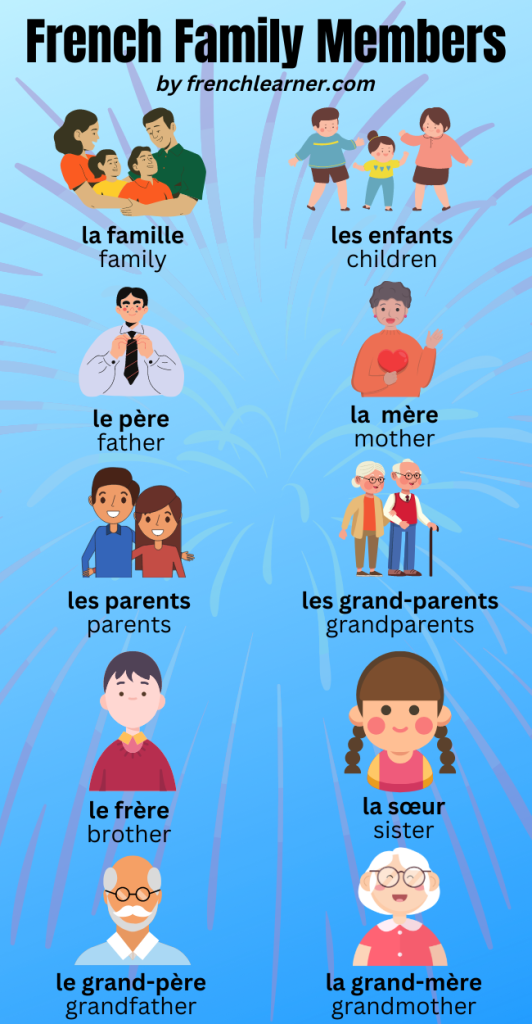
Sharing is caring!
Affiliate disclosure: Below you will find affiliate links. If you purchase something after clicking the link, we will receive a small commission. To learn more please visit our full disclosure page . Merci!

Read our full review of À Moi Paris and find out why we love it so much!

Read our full review of French Verb Drills and find out why we recommend this course!
David Issokson
David Issokson is a lifelong language enthusiast. His head is swimming with words and sounds as he speaks over six languages. Of all the languages he speaks, he's the most passionate about French! David has helped hundreds of students to improve their French in his private online lessons. When procrastinating working on his site, FrenchLearner.com, David enjoys his time skiing and hiking in Teton Valley, Idaho.
See all posts by David Issokson
Sophia Bush comes out as queer, confirms relationship with Ashlyn Harris

Actor Sophia Bush came out as queer in an emotional essay in Glamour and confirmed she’s in a relationship with retired U.S. Women’s National Team soccer player Ashlyn Harris.
“I sort of hate the notion of having to come out in 2024,” Bush wrote in a cover story for the fashion magazine published Thursday. “But I’m deeply aware that we are having this conversation in a year when we’re seeing the most aggressive attacks on the LGBTQIA+ community in modern history.”
Bush noted that there were more than 500 anti-LGBTQ bills proposed in state legislatures last year and said this motivated her to “give the act of coming out the respect and honor it deserves.”
“I’ve experienced so much safety, respect, and love in the queer community, as an ally all of my life, that, as I came into myself, I already felt it was my home,” she wrote. “I think I’ve always known that my sexuality exists on a spectrum. Right now I think the word that best defines it is queer . I can’t say it without smiling, actually. And that feels pretty great.”
The “One Tree Hill” star filed for divorce from entrepreneur Grant Hughes in August. People magazine first reported in October that Bush and Harris were dating, but neither confirmed nor commented on the report. The pair later attended an Oscar’s viewing party together in March .
In the essay, Bush addressed online rumors that her relationship with Harris began before Harris had officially divorced from fellow soccer star Ali Krieger, in September.
“Everyone that matters to me knows what’s true and what isn’t,” Bush wrote. “But even still there’s a part of me that’s a ferocious defender, who wants to correct the record piece by piece. But my better self, with her earned patience, has to sit back and ask, What’s the f------- point? For who? For internet trolls? No, thank you. I’ll spend my precious time doing things I love instead.”
Bush said that after news about her and Harris became public, her mom told her that a friend called and said, “Well, this can’t be true. I mean, your daughter isn’t gay .”
“My mom felt that it was obvious, from the way her friend emphasized the word, that she meant it judgmentally,” Bush wrote. “And you know what my mom said? ‘Oh honey, I think she’s pretty gay. And she’s happy .’”
Bush wrote that she felt like she was wearing a weighted vest that she could finally put down.
“I finally feel like I can breathe,” Bush wrote. “I turned 41 last summer, amid all of this, and I heard the words I was saying to my best friend as they came out of my mouth. ‘I feel like this is my first birthday,’ I told her. This year was my very first birthday.”
For more from NBC Out, sign up for our weekly newsletter.
Jo Yurcaba is a reporter for NBC Out.

COMMENTS
Knowing how to describe the structure of your family in French. To describe the structure of your family in French, you need to follow the guidelines below: 1. Ton nom (your name). Here, you need to mention your name in any of the following formats: Je m'appelle Elvis Fiati. Mon est Fiati, mon prénom est Elvis. (My name is Elvis Fiati.
Ma Famille - My Family - An Essay in French is to help students and people learning French to write a short essay in French. Students of grades 5 - 8 can wat...
Here are a few phrases you might want to know to talk or write about your family: J'ai une grande famille - "I have a big family.". J'aime ma famille - "I love my family.". La famille d'abord - "family comes first". La famille pour toujours - "family forever".
I present to you my mother.) Je te présente…. (I present to you…) Use the tu form when speaking to a friend, an equal or someone younger than yourself. In this case, you are introducing a family member to someone who fits this profile, but while using a more formal structure: Salut, Brigitte!
How to Write about Family in French | My Family in French 10 Lines - Learn FrenchIn this video, we will learn to write an Essay on My Family in French Langua...
Moi et ma famille. Me and My Family. Bonjour, je m'appelle Élisabeth. J'ai vingt-neuf ans et je suis française. Je suis née à Lyon mais j' ai grandi à Marseille. Je suis allée à l'université à Paris. Maintenant, j'habite à Strasbourg et je suis ingénieur. Translation. Hello, my name is Élisabeth.
The French word for "family" is la famille. It's a feminine word and can also be used to say "relatives" in some cases. If you want to talk about your family specifically, you can say ma famille. The pronoun "ma" is used because famille is a feminine word.
1- The Inner Circle. Here are the most basic family members in French, the ones you'll likely talk the most about. "My folks" [Slang. Literally: "My old-ones"] /!\. Do not confuse mon parent, meaning "my relative," and mes parents meaning "my parents. Un parent meaning "a relative," and des parents meaning "relatives ...
The Must-Know Terms For Talking About Family In French. family — la famille. relatives — la famille élargie. extended family — la famille éloignée. mother — la mère. father — le père. parents — les parents. sister — la s œur. brother — le frère. siblings — les frères et s œurs. daughter — la fille. son — le fils ...
Family in French. How to talk about your family in French.In this French lesson, Pearl, a native French speaker is teaching you how to introduce your family ...
Ma famille me soutient toujours. (My family always supports me.) This phrase is used to indicate the support you receive from your family. Learning these common French phrases for talking about family will help you to communicate more effectively with native French speakers and better express yourself in a French-speaking environment.
1. Text Summary (Synthèse de texte) The text summary or synthèse de texte is one of the easiest French writing exercises to get a handle on. It essentially involves reading a text and then summarizing it in an established number of words, while repeating no phrases that are in the original text.
Ils aident les gens qui ont besoin de leur aide, alors beaucoup de gens les aiment. Je suis aussi très fier de mes parents. I live with my family in a small house. There are three members in my family. They are my father, my mother and me. My house is always safe because of them. I love them very much and they also love me.
If you're learning to speak French, you might find yourself talking about la famille among friends and relatives quite a lot. To simplify the learning for you, this article first introduces an overview of close and extended family members in French, then clarifies some of the common misconceptions and differences between the English and French expressions.
Grand-père. This French noun combines the words "grand" and "père", which mean "grand" and "father. It means "grandfather" in English and can be used to refer to your mother's father, or your father's father. Usage example: Sophie demandait des chocolats à son grand-père tous les samedis.
In this lesson, we'll go over some useful French phrases that will come in handy when talking about your family. "Je suis marié (e)" - "I am married". Use this phrase to inform someone that you are married. If you're not married, you can say "Je suis célibataire" to indicate that you're single. "J'ai des enfants ...
The first paragraph of your French essay should briefly introduce the topic and engage the reader. Here are some examples to help you write your essay: In recent years, the [topic] has become a hotly debated issue, with [brief outline of arguments]. The [subject] has been the subject of controversy for several decades, with [brief overview of ...
la tante - aunt. le neveu / les neveux - nephew / nephews. la nièce / les nièces - niece / nieces. le cousin - male cousin. la cousine - female cousin. It's interesting to note that in the French family vocabulary, "parent" means not only "mother" or "father" but "relative" in general, as well.
In-laws and step family. La belle-famille refers to the in-laws. When describing family members by marriage, the French do not distinguish between in-laws and step. For example, "le beau-père" means both father-in-law and step-father. Interestingly, "le demi-frère" translates to both half brother and step brother. Logically, "la demi-soeur" translates to half sister and step sister.
This video teaches how to describe your family using simple French. This video is for the new learners of French.
If you want to talk about your family, the verb. avoir. (to have) is useful. Avoir is an irregular verb. Regular verbs follow the same pattern, but irregular verbs don't. The spelling of the ...
Do you need to write an essay in French? Whether you are a student, a traveler, or a language lover, you can benefit from learning some useful French essay phrases. In this article, you will discover 30 common expressions that will help you structure your arguments, introduce your ideas, and connect your thoughts in a clear and elegant way. Plus, you will also find some tips on how to improve ...
Publish on June 19, 2021Bonjour (Hello)Hope you all are doing well!📚 Learn French Online with Neha at French For beginners Easy way to use in everyday life ...
Actor Sophia Bush came out as queer in an emotional essay in Glamour and confirmed she's in a relationship with retired U.S. Women's National Team soccer player Ashlyn Harris.